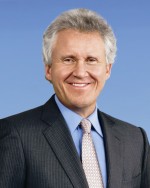Jeff Immelt (Emeritus)
Share
Chairman and CEO, General Electric
 Jeffrey R. Immelt is the ninth chairman of GE, a post he has held since September 7, 2001.
Jeffrey R. Immelt is the ninth chairman of GE, a post he has held since September 7, 2001.
Mr. Immelt has held several global leadership positions since coming to GE in 1982, including roles in GE’s Plastics, Appliance, and Medical businesses. In 1989 he became an officer of GE and joined the GE Capital Board in 1997. A couple years later, in 2000, Mr. Immelt was appointed president and chief executive officer.
Mr. Immelt has been named one of the “World’s Best CEOs” three times by Barron’s, and since he began serving as chief executive officer, GE has been named “America’s Most Admired Company” in a poll conducted by Fortune magazine and one of “The World’s Most Respected Companies” in polls by Barron’s and the Financial Times.
Mr. Immelt is the chair of President Obama’s Council on Jobs and Competitiveness. He is also a member of The Business Council.
Mr. Immelt earned a B.A. degree in applied mathematics from Dartmouth College in 1978 and an M.B.A. from Harvard University in 1982. He and his wife have one daughter.
GE is fortunate to have some of the world’s best engineers, innovators, and technology experts working under our roof. We invest heavily so that they can drive the most advanced ideas off the drawing board and into development.
For some of the markets where we do business, like healthcare, a really good idea can gain market share simply by solving a new problem or by outsmarting the competition. But in energy, we don’t have that kind of dynamic market situation; a big year in the U.S. electricity market is 2 percent or 3 percent growth. The current energy markets don’t favor cleaner technology or low- carbon; they stop at affordability and reliability.
For a challenge as mammoth as energy, innovation must adapt – and policy must encourage it. Since I started at GE in 1982, our health care division has evolved through a half dozen advances in technology. over that same period, energy technology has hardly budged. this has nothing to do with the quality of our engineers, but it has everything to do with the marketplace where they do business.
No business will invest when there is no certainty about what a market will look like two, five or 10 years into the future. If we’re serious about transforming our energy markets, we must send the right signals and create demand for the technologies that solve these problems.